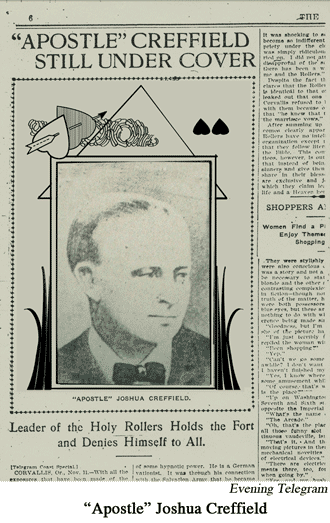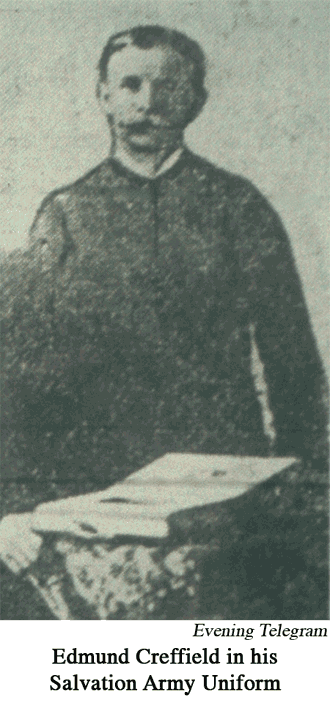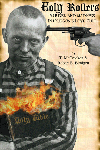Holy Rollers: Murder and Madness in Oregon's Love Cult
by T. McCracken and Robert B. Blodgett
CHAPTER ONE
Trust Me Brother's and Sisters
***
In the beginning God created the heaven and the earth.
Genesis 1:1
***
 "Trust
me, brothers and sisters, I am God's exclusive messenger and
He wants you to obey me implicitly. He wants you to join me
in a life of deprivation, degradation--and orgies. In
so doing, you will drive your families mad and they will
have you committed to the insane asylum--the loony bin. Come, let us roll on the ground and pray."
"Trust
me, brothers and sisters, I am God's exclusive messenger and
He wants you to obey me implicitly. He wants you to join me
in a life of deprivation, degradation--and orgies. In
so doing, you will drive your families mad and they will
have you committed to the insane asylum--the loony bin. Come, let us roll on the ground and pray."
Had Edmund Creffield said this during his first street corner sermon in Oregon in 1899 he would have had few if any followers. "Some sort of lunatic," people would have whispered to their children, grasping their hands as they sped away from him. Alas, Creffield didn't sound like a lunatic at first.
The secret to Creffield's charisma? Not his physical stature. Creffield, a small man, five-foot-six, 135 pounds, with light hair and pale blue eyes, was "a very homely man"--or so said Burgess Starr. "But he attracted women wonderfully." And not just any women, but women who were the wives and daughters of respected men, women of high character and standing, God-fearing, decent women.
"His power over his followers, who were nearly all women, was something wonderful," O. V. Hurt, Burgess Starr's brother-in-law, said. "They did whatever he said. They were dead to all human sympathies. They let their children, their husbands and their parents go uncared for and without a kind thought or word."
"Creffield was a hypnotist," Burgess said.
 Louis Sandell, another of O. V.'s
in-laws, said that Creffield had a "look that seemed to cast
a spell over a person," and that he himself personally "felt
more secure the farther away from him."
Louis Sandell, another of O. V.'s
in-laws, said that Creffield had a "look that seemed to cast
a spell over a person," and that he himself personally "felt
more secure the farther away from him."
"During his schooling he made a particular study of mental telepathy and, it is claimed, became something of an expert in the science of thought transference," someone else said. Correspondence courses in hypnotism were popular at the time, courses that promised to "make women bend to your will."
A look that cast a spell? Mental telepathy? The science of thought transference? And these are statements made by people in this story who weren't eventually committed to the insane asylum.
As ludicrous as these all sounded, they were easier to accept than the idea that Creffield was God's exclusive messenger. But this is jumping ahead, for Creffield hadn't always held such power over people. In 1899 he was a soldier in the Salvation Army in Portland, Oregon, preaching with mixed success to anyone who would listen to him. When the Salvation Army had "opened fire" there twelve years earlier, they hadn't exactly been held in the highest esteem either. Thought of as a group of religious crackpots, they were routinely spat upon, pelted with rotten eggs, vegetables, and rocks, all the while thanking their tormenters, saying the attacks strengthened their determination. It was enough to drive the less righteous crazy.
By the time Creffield joined the organization, the Salvation Army had gained a certain amount of respectability. Initially it was thought he might make a promising officer and was sent to Officer-Training School. His halo soon tarnished, though, as he began quibbling with his fellow soldiers--often about money because wherever he was posted--The Dalles, 85 miles east of Portland; Oregon City, 13 miles south of Portland; McMinnville, 40 miles south-west of Portland; and Heppner, in eastern Oregon--donations plummeted. Donations were everything to the Salvation Army--or so Creffield claimed.
The Holy Ghost apparently didn't approve of this policy because in 1901 the Holy Ghost, Creffield said, directed him "not to solicit for money," and to leave the Salvation Army because "its people are not entirely of God."
"Creffield does not like to be controlled by others," said a fellow soldier, "but wants everything his own way, and that is why he left the Salvation Army."
No matter. Creffield resigned his position and went to, as he said, "tarry" with Martin L. Ryan at his Pentecostal Mission and Training School in Salem. Ryan's group was part of a Holiness Movement that taught the Bible in its entirety--from the first word of Genesis to the last word of Revelation--"And if any man shall take away from the words of the book of this prophecy, God shall take away his part out of the book of life."--Revelation 22:19.
To Ryan, churches in America were honeycombed with sin and apathy. Just look at the what had happened to the Methodists. Many Methodists were practically infidels, leading lives filled with carnal and selfish desires. Go to the home of one and you might be invited to partake of worldly amusements and sinful pleasures such as card-playing, smoking, drinking, and dancing--or, most objectionable, a discussion on Darwin's theory of evolution. Such things had no place in the lives of members of Ryan's group. Even if they had wanted to partake of these amusements, they had no time, for they went to evangelistic meetings nightly--not being content to attend services only on Sundays. These days Methodists pooh-poohed such meetings.
During his time with Ryan, a new doctrine was "revealed" to Creffield--he was God's Elect. He went to preach this new doctrine in Corvallis. Corvallis was in the heart of the Willamette Valley, the "Eden" at the end of the Oregon Trail. Thousands had came to the Oregon Territory for many reasons, but most came because there was the promise of land--free land that was productive beyond belief--preachers not being the only ones making astonishing claims. Peter Burnett, later governor of California, said: "Gentlemen, they do say, that out in Oregon the pigs are running about under the great acorn trees, round and fat, and already cooked, with knives and forks sticking in them so that you can cut off a slice whenever you are hungry."
When Creffield arrived in Corvallis, it was a small farming community and home to Oregon Agricultural College, a land-grant institution. People there led fairly orderly lives--ordinances had even recently been passed that prohibited livestock from roaming the streets at night.
Everybody knew everything about everyone else in town--the two papers, the Corvallis Times and the Corvallis Gazette, made sure of that. Everything was reported. Everything!
Go out of town--it was reported. "A swift journey on a bicycle was made Saturday by Frank Hurt," the Times reported on October 26, 1901. "He went from Corvallis to Oregon City in six hours. It is not likely that the trip was ever made by wheel in so short a time."
Come back to town--it was reported. "Clarence Starr returned home Tuesday from Seaside, Oregon," the Gazette reported on November 1, 1901, "where he had been employed for several months in a sawmill. He relates an amusing story at the expense of the little pumpkin vine railroad that runs from Warrenton to Seaside. While en route home, traveling over this line, the train slowed down, that is, it went slower than usual and the whistle was repeatedly blown in vain efforts to 'shoo' a cow off the track. It seemed impossible to make her give the right of way and a wearied passenger finally agreed to give her a start, which he did. She seemed quite alarmed at the demonstrations of the passenger and, throwing her tail to the breeze, continued her way on down the track at her liveliest gait. The passenger climbed back onto the 'whole train' and the engine was turned loose to make up for the time lost. After about half an hour's run the train again slowed down and the shrill whistle resounded along the coast. The passenger inquired what was the matter now. He was answered by the conductor who stated that they had caught up with the cow."
Have a good day at work--it was reported. "Frank Hurt is reported to be doing exceedingly well in his position as shipping clerk at Ainsworth dock, Portland, the Gazette reported on December 3, 1901. "A few days ago he checked a China steamer in and out. This is quite an undertaking and requires considerable knowledge and great accuracy. He is well spoken of by his employers."
Have a bad day at work--it was reported. "It was not a cyclone or a cattle stampede, though not many of the symptoms were lacking," the Times reported on May 29, 1901. "It happened in Kline's store Saturday evening. The employees were boxing eggs for shipment. Victor Hurt stooped over an egg case and rummaged in the bottom, when a big rat ran up his arm on his shoulder, brandishing his tail in his face. Hurt, convinced that it was the panther reported at large west of town, fell over himself in terror and set up a commotion that brought all employees to the scene. Armed with brooms, pocket shears and bars of soap the boys began a chase that finally ended with the death of the rat just outside the front door. The only hurt sustained in the incident was by Hurt, whose nerves were so hurt that he still sees rats in every old box about the store."
Sometimes the most exciting items in the paper could be found in the church notes: "Unearthed!" the Gazette reported on January 5, 1900. "Exposed! Made public! Terrible tragedy! Full details! Names given! A blood stained bag! Ghastly contents to be exposed Saturday night 8 o'clock at the Salvation Army Hall, January 6th. Full particulars of greatest crime ever made public. All are welcome."
The crime that Creffield was about to commit in Corvallis was thought to be one of the greatest--if not the greatest--crimes ever made public in the city's history. At the time the papers dutifully followed and printed the details of this crime. Secrets were unearthed. Private lives were exposed. All of it was made public. Names were named. Reputations were stained. It was a terrible tragedy.
And every time people thought it couldn't get any worse, it did.
***
Blessed are ye, when men shall revile you, and persecute you, and shall say all manner of evil against you falsely, for my sake.
Matthew 5:11
![]() Chapter 2: Creffield's Preachings
Chapter 2: Creffield's Preachings
***
Some of the newspaper articles that are sources for this chapter:
Corvallis Gazette & Corvallis Times from 1897 to 1903 B.C. (Before Creffield)
***
Chapters from
Holy Rollers: Murder & Madness in Oregon's Love Cult
Part 1: The Seduction
Chapter 1: Trust Me, Brothers And Sisters
(Life Before Creffield [B.C.])
Chapter 2: God, Save Us From Compromising Preachers
(Creffield's Preachings)
Chapter 3: The Flock
(Profiles of the Holy Rollers Were)
Chapter 4: The Holy Rollers
(Things Start to Get Wild on on Kiger Island)
Chapter 5: Housecleaning
(There's a Sacrificial Bonfire)
Chapter 6: Community Concerns
(Officers Visit)
Chapter 7: Esther, The Chosen One
(Creffield Plans to Marry 16-Year- Old)
Chapter 8: Tar and Feathers
(The Men of Corvallis Act)
Chapter 9: Sane People Don’t Go Bareheaded
(Holy Rollers are Committed to the Asylum)
Chapter 10: More Beast Than Man
( Creffield is Arrested)
Chapter 11: God Will Plead Creffield's Case
(Creffield in Court)
Chapter 12: Scandal
(Shocking Testimony at the Trial)
Chapter 13: Calm Before the Storm
(The Holy Rollers Resume their Lives)
Chapter 14: Giving Up The Ghost
(Men are Gunning for Creffield)
Part Two: The People V. Creffield
Chapter 16: The Widow Creffield
Chapter 19: An Inherited Streak of Insanity
Part Three: The Madness
Chapter 23: Seeking Reconciliation
Chapter 24: Another Holy Roller Page One Murder
Chapter 25: What Can Papa Do For You?
Chapter 26: Human Life is Too Cheap In This Community
Chapter 30: The Final Chapter
(What Happened to Everyone Afterwards)
The Epilogue
(Heaven's Gate)
Newspaper Articles about Creffield & the Holy Rollers
1897-1903: B.C. (Before Creffield)
October to December 1903:Holy Rollers Burn Furniture & Pets
January to March, 1904: Holy Rollers Tarred and Feathered
April to June 1904: Holy Rollers are Committed to the Asylum
July 1904: Creffield is Found & Arrested
September 1904: Creffield's Trial
April 1906: Men are Gunning For Creffield
May 1906: Creffield is Murdered, Murderer is Considered a Hero
May 1906: Holy Rollers Found Starving Near Heceta Head
June 1906: George Mitchell's Trial Begins
July 1906: Hurt Testifies of Debauched Wife and Debased Sisters
July 1906: Esther Mitchell Kills Her Brother
August to October 1906: Seattle Prepares for another Big Trial
November 1906: Maud Hurt Creffield Commits Suicide
April 1909-August 1914: Esther Leaves the Asylum
1953 Stewart Holbrook's Murder Without Tears
1951Startling Detective Magazine, Nemesis of the Nudist High Priest
***
